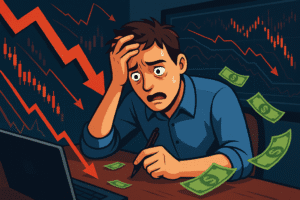Why New Traders Lose Big in Forex: Key Reasons Explained
The foreign exchange (forex) market, with its daily trading volume of over $7.5 trillion, presents an alluring opportunity for individuals seeking financial growth. However, the path to profitability is fraught with challenges, and a staggering number of new traders find themselves on the losing end. Understanding why new traders lose big in forex is the first and most critical step towards navigating this complex market successfully. This comprehensive guide will delve into the key reasons behind these significant losses, offering actionable insights to help aspiring traders avoid common pitfalls and build a sustainable trading career.
The reality is that a high percentage of retail forex traders lose money. While exact figures vary, regulatory bodies and brokers often disclose that between 70% and 90% of retail accounts are unprofitable. This isn’t to discourage participation but to underscore the importance of education, discipline, and a strategic approach. This article will explore the multifaceted reasons for these losses, from psychological biases to fundamental analytical errors.
The Critical Role of a Solid Trading Plan
One of the most prevalent reasons why new traders lose big in forex is the absence of a well-defined trading plan. A trading plan is not merely a vague intention to make money; it’s a structured, written document that outlines a trader’s goals, risk tolerance, and the specific rules for entering, managing, and exiting trades. Without this roadmap, traders are essentially navigating a minefield blindfolded.
Elements of a Robust Trading Plan:
- Clear Goals: What are you trying to achieve with forex trading? Are you seeking supplemental income or long-term capital growth? Your goals will influence your trading style and risk appetite.
- Risk Management Strategy: This is arguably the most crucial component. It dictates how much of your capital you are willing to risk on a single trade, typically recommended to be between 1% and 2%.
- Entry and Exit Criteria: Your plan should specify the exact technical or fundamental conditions that must be met before entering or exiting a trade. This removes emotional decision-making from the equation.
- Trading Journal: A detailed record of your trades, including the rationale behind them and their outcomes, is invaluable for identifying patterns in your performance and making necessary adjustments.
A study by the National Bureau of Economic Research on individual investor performance has consistently shown that those with a systematic approach outperform those who trade on whims. A trading plan is the embodiment of that systematic approach in the forex market.
The Perils of Inadequate Risk Management
Closely tied to the absence of a trading plan is the failure to implement proper risk management. Many new traders are so focused on the potential for profit that they neglect the very real possibility of loss. This oversight is a primary contributor to why new traders lose big in forex.
Common Risk Management Failures:
- Overleveraging: Forex brokers offer high leverage, which allows traders to control large positions with a relatively1 small amount of capital. While leverage can amplify profits, it can just as easily magnify losses. A small market movement against an overleveraged position can wipe out a trading account. The U.S. Commodity Futures Trading Commission (CFTC) has regulations in place to limit leverage for retail forex traders, highlighting its inherent risks.
- Ignoring Stop-Loss Orders: A stop-loss order is an instruction to your broker to close a losing trade at a predetermined price. Failing to use stop-loss orders is akin to driving a car without brakes. It exposes a trader to unlimited downside risk.
- Poor Risk-to-Reward Ratio: A favorable risk-to-reward ratio ensures that your potential profit on a trade is greater than your potential loss. For example, a 1:3 risk-to-reward ratio means you are risking $1 to potentially make $3. Consistently entering trades with a poor risk-to-reward ratio makes it mathematically difficult to be profitable in the long run.
For further reading on risk management, Investopedia provides an excellent overview of the core principles.
The Unseen Enemy: The Psychology of Trading
The psychological aspect of trading is often underestimated by newcomers, yet it is a significant factor in why new traders lose big in forex. The emotional rollercoaster of fear and greed can lead to irrational decisions that deviate from a well-thought-out trading plan.
Destructive Emotional Biases:
- Fear of Missing Out (FOMO): This occurs when a trader sees a currency pair making a strong move and jumps into a trade without proper analysis, fearing they will miss out on a profitable opportunity. This often leads to entering a trade at the worst possible time.
- Revenge Trading: After a losing trade, some traders feel an overwhelming urge to “get back” at the market. They may enter larger, riskier trades in an attempt to recoup their losses quickly, often leading to a spiral of further losses.
- Confirmation Bias: This is the tendency to seek out information2 that confirms one’s existing beliefs and ignore information that contradicts them. In trading, this can mean only paying attention to indicators that support a desired trade, while disregarding warning signs.
Mastering trading psychology is a journey of self-awareness and discipline. Resources from reputable sources like BabyPips.com can provide a solid foundation in understanding and managing these emotional challenges.
The Dangers of Insufficient Education and Market Understanding
Jumping into the forex market without a proper education is a recipe for disaster. The market is influenced by a complex interplay of economic, political, and social factors. A superficial understanding of these dynamics is a key reason why new traders lose big in forex.
Essential Areas of Forex Education:
- Fundamental Analysis: This involves analyzing economic data, such as interest rates, inflation, and GDP growth, to determine the intrinsic value of a currency. Central bank decisions, like those from the Federal Reserve or the European Central Bank, are major market movers.
- Technical Analysis:3 This involves studying price charts and using various indicators to identify patterns and predict future price movements. While not a crystal ball, technical analysis provides a framework for making informed trading decisions.
- Market Structure and Participants: Understanding who the major players in the forex market are (central banks, institutional investors, etc.) and how they operate can provide valuable context for market movements.
New traders should invest time in quality educational resources, including books, online courses, and webinars from reputable providers.
The Allure of Unrealistic Expectations
The forex market is often marketed as a get-rich-quick scheme, which fosters unrealistic expectations among new traders. The belief that one can achieve massive returns with little effort or knowledge is a dangerous mindset and a primary contributor to why new traders lose big in forex.
Grounding Your Expectations in Reality:
- Trading is a Business, Not a Lottery: Successful trading requires hard work, dedication, and a professional approach. It is not a gamble.
- Profits are Not Instantaneous: Building a profitable trading account takes time and consistency. There will be losing trades and periods of drawdown.
- Focus on the Process, Not Just the Profits: By concentrating on executing a solid trading plan and managing risk effectively, profitability will be a natural byproduct.
The Pitfall of Overtrading
Overtrading, the excessive buying and selling of currencies, is a common mistake that can quickly erode a trading account through commissions, spreads, and poor decision-making. It often stems from a combination of FOMO, revenge trading, and a lack of a clear trading strategy. This compulsion to always be in the market is a significant reason why new traders lose big in forex.
How to Avoid Overtrading:
- Stick to Your Trading Plan: Only enter trades that meet your predefined criteria.
- Quality Over Quantity: Focus on high-probability setups rather than taking every potential opportunity.
- Take Breaks: Staring at charts for hours on end can lead to mental fatigue and impulsive decisions. Step away from your trading desk to clear your head.
Conclusion: Paving the Way for Forex Trading Success
The reasons why new traders lose big in forex are multifaceted but largely avoidable. The common threads running through these failures are a lack of preparation, discipline, and a realistic understanding of the market. By prioritizing education, developing a comprehensive trading plan with a strong emphasis on risk management, and mastering the psychological challenges of trading, new traders can significantly improve their odds of success.
The journey to becoming a consistently profitable forex trader is a marathon, not a sprint. It requires a commitment to continuous learning and self-improvement. By acknowledging the potential pitfalls and taking proactive steps to mitigate them, you can build a strong foundation for a long and successful career in the dynamic world of forex trading.
📈 Expand Your Financial Knowledge
🚫 Forex Mistakes: Avoiding Losses
Understand how inexperience in Forex trading leads to heavy financial setbacks.
💹 How to Invest in the Share Market
Step-by-step guide to becoming a confident investor in the stock market.
🕌 Is Share Market Halal?
Explore Islamic perspectives on investing in shares and ethical finance.
🎯 What is a Niche Market?
Learn how targeting niche audiences can lead to sharper business growth.




